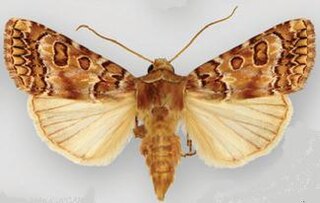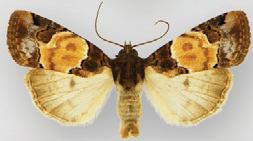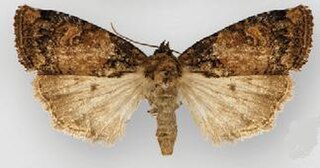
Hypotrix is a genus of moths of the family Noctuidae.

Bryolymnia viridata is a moth of the family Noctuidae first described by Leon F. Harvey in 1876. It is found in the US in western California from Sonoma County north of San Francisco southward to San Diego County.

Hypotrix ferricola is a moth of the family Noctuidae first described by Smith in 1905. It is found in southern North America from south-eastern Arizona, south-western New Mexico and northern Mexico.

Hypotrix diplogramma is a moth of the family Noctuidae first described by William Schaus in 1903. It is found in southern North America from eastern Arizona and south-western New Mexico southward at least to Mexico City.

Hypotrix ocularis is a moth of the family Noctuidae. It is found from south-western New Mexico and south-eastern Arizona southward to Mexico City.

Hypotrix basistriga is a moth of the family Noctuidae. It is known only from the White Mountains and Pinaleño Mountains in eastern Arizona.

Hypotrix hueco is a moth of the family Noctuidae first described by William Barnes in 1904. It is known only from south-eastern Arizona in the United States.

Bryolymnia viridimedia is a moth of the family Noctuidae first described by John Bernhardt Smith in 1905. It is found from south-eastern Arizona southward in the Sierra Madre Occidental to the Mexico City area.

Bryolymnia bicon is a moth of the family Noctuidae first described by Herbert Druce in 1889. It is found from Veracruz in central-eastern Mexico southward to Costa Rica.

Bryolymnia biformata is a moth of the family Noctuidae first described by Donald Lafontaine and J. Walsh in 2010. It is known only from the Huachuca, Patagonia, and Santa Rita Mountains in south-eastern Arizona.

Bryolymnia anthracitaria is a moth of the family Noctuidae first described by Clifford D. Ferris and Noel McFarland in 2007. It is known only from south-eastern Arizona where it has been collected in oak scrub grassland.

Bryolymnia poasia is a moth of the family Noctuidae first described by William Schaus in 1911. It is found in Costa Rica.

Bryolymnia semifascia, the half-banded bryolymnia, is a moth of the family Noctuidae. The species was first described by John Bernhardt Smith in 1900. It is found in the US from northern Colorado and southern Utah southward to south-eastern Arizona and south-central New Mexico.

Bryolymnia picturata is a moth of the family Noctuidae first described by William Schaus in 1894. It is found in south-eastern Mexico.

Bryolymnia ensina is a moth of the family Noctuidae first described by William Barnes in 1907. It occurs in coniferous forests from south-eastern Arizona and south-western New Mexico southward in the Sierra Madre Occidental to the state of Durango in Mexico.
Xestia laxa is a species of cutworm or dart moth in the family Noctuidae. It was described by J. Donald Lafontaine and Kauri Mikkola in 1998 and is found in North America.
Homorthodes dubia is a species of cutworm or dart moth in the family Noctuidae. It was described by William Barnes and James Halliday McDunnough in 1912 and is found in North America.
Neleucania patricia is a species of cutworm or dart moth in the family Noctuidae. It is found in North America.

Lacinipolia triplehorni is a species of cutworm in the family Noctuidae. It is found in North America.

Tricholita chipeta is a species of cutworm or dart moth in the family Noctuidae. It was first described by William Barnes in 1904 and it is found in North America.
This page is based on this
Wikipedia article Text is available under the
CC BY-SA 4.0 license; additional terms may apply.
Images, videos and audio are available under their respective licenses.







